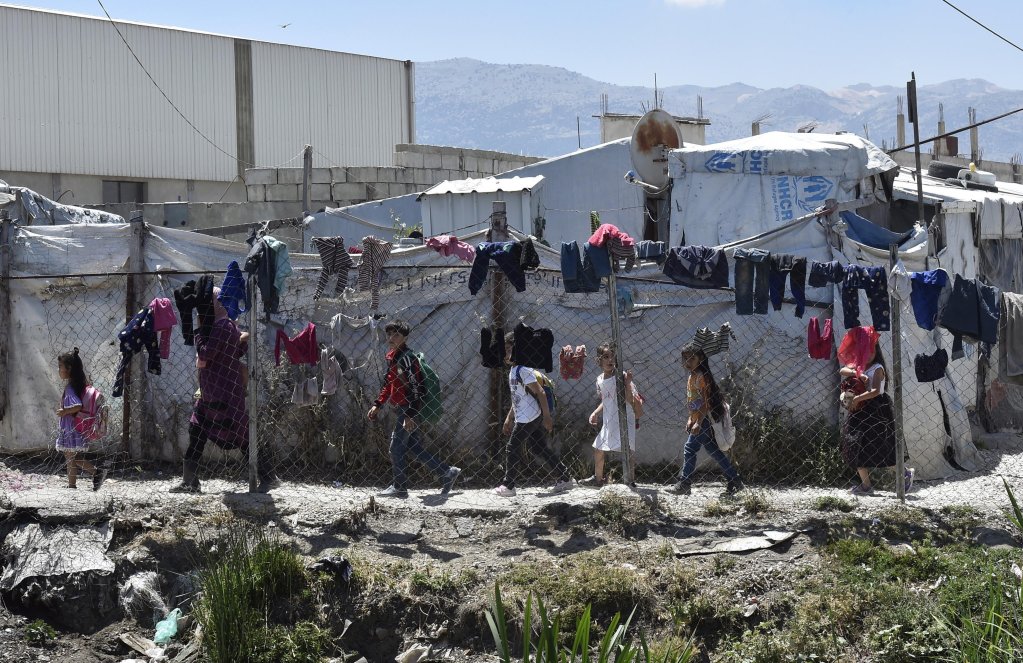
The EU’s recently signed deal with Lebanon to provide financial assistance for hosting refugees and boosting border security comes as Lebanese authorities pursue an “unprecedented” crackdown targeting Syrian refugees. Human rights groups fear that the deal will keep refugees out of Europe while facilitating their deportation to Syria, in violation of human rights obligations.
In early May, eight civil society organisations, including Global Detention Project partner Access Center for Human Rights (ACHR), released a joint statement to urge the European Union and Lebanon to respect their obligations under international law and refrain from forcibly returning Syrian refugees to their country. The statement comes in response to the recent EU-Lebanon deal, which provides for the allocation of 1 billion EUR in financial aid to Lebanon over the next three years.
Lebanon has faced considerable challenges in hosting large numbers of refugees, mostly coming from neighbouring Syria, which has been torn by a civil war since 2011. With the escalating conflict in the Middle East, the number of Palestinians fleeing into the country has also surged. With more than 1.5 million Syrian refugees and over 210,000 Palestinians, Lebanon has the highest per-capita concentration of refugees in the world, making up 30 percent of its population.
Lebanon’s response to these challenges, however, has recently taken a sharply hardening direction. According to ACHR, since the start of 2024 there has been an “unprecedented crackdown on refugees by the Lebanese authorities is still being carried.” ACHR has documented 685 cases of arbitrary arrests, 433 cases of forced deportations, and 1,306 forced evictions between January 1, 2024, and April 30, 2024. The group says, however, that the “The actual numbers are unfortunately much higher.”
Despite Lebanon’s severe financial crisis, UNHCR has announced plans to halve its support for refugee health coverage in the country due to “drastic budget cuts caused by crises across the world.” This may further exacerbate widespread anti-Syrian sentiment and hostility towards Lebanon’s refugee population, who are often blamed for the country’s crisis.
The EU-Lebanon deal
According to European Commission President Ursula von der Leyen, the deal with the EU is intended to “contribute to Lebanon’s socio-economic stability” by promoting economic reforms and boosting services such as education and healthcare. Three-quarters of the amount is intended to assist Lebanon in providing for their refugee population, while the other quarter to supply the Lebanese Armed Forces with equipment and training for border management.
However, the deal has caused much scepticism, and many in Lebanon and beyond see it as bribery and an EU attempt to keep refugees outside of its borders. “This is first and foremost about preventing migration to Cyprus and the rest of Europe,” says Kelly Petillo, from the European Council on Foreign Relations. She added that “giving money to the Lebanese military means more insecurity for the Syrian refugees,” resulting in a surge of deportations or further pressure for refugees to move towards Europe, achieving the opposite of what the EU intended.
Says ACHR’s Mohammad Hassan, “Forced disappearances and torture in Syrian detention centers and prisons hasn’t stopped. This deal makes the EU complicit in violations of human rights of forcibly deported Syrian refugees.” He adds that the “main barrier behind Syrians’ inability to repatriate is the existing political and security regime. Any solution that does not prioritize mitigating the reasons behind forced displacement won’t be sustainable.”
Widespread concerns over the safety of Lebanon-based refugees
Many human rights organisations raise concerns over the consequences that the deal could have in terms of refugees’ safety. Cyprus had already witnessed a surge in the numbers of Syrian refugees arriving by sea from Lebanon, with over 2,000 arrivals at the beginning of the year. Consequently, in April they suspended the processing of all asylum applications by Syrian nationals.
As the GDP has previously reported, the economic and political instability that affected Lebanon in recent years led to increased efforts from the Lebanese army to forcibly remove Syrian refugees from the country, resulting last year in arbitrary detentions and unlawful deportations. Commenting on Ursula von der Leyen’s statements, Philippe Dam, Human Rights Watch’s EU director, said, “She announced support for the Lebanese security forces on migration and border management which could be problematic. Because these people are the ones practising coerced deportation of Syrians.”
The UN Human Rights Committee raised concerns over Lebanon’s strict border admission regulations, resulting in restricted access to asylum and risks of deportations, pushbacks and refoulement; reports of prolonged administrative detentions of asylum seekers and refugees–including children–without due process; the extensive discretionary powers granted to the General Security Office regarding decisions to detain and deport people from Lebanon, and their impossibility to appeal such decisions; reports of evictions, curfews and raids targeting Syrian refugees.
In their joint statement, Amnesty International and other signatories expressed worry over the EU-Lebanon deal’s intent to “expand return assistance programming to so-called ‘safe areas’ inside Syria to incentivise refugee returns,” despite the United Nations declaring that Syria remains unsafe for return. A UN report documents that Syrian refugees are subject to extensive human rights violations and abuses upon returning to Syria, including arbitrary detentions, torture, sexual and gender-based violence, disappearance, and abduction. Considering this, Amnesty International and other organisations denounced that with their deal, the EU and Lebanon risk being “complicit in violations of the customary international law principle of non-refoulement.”


